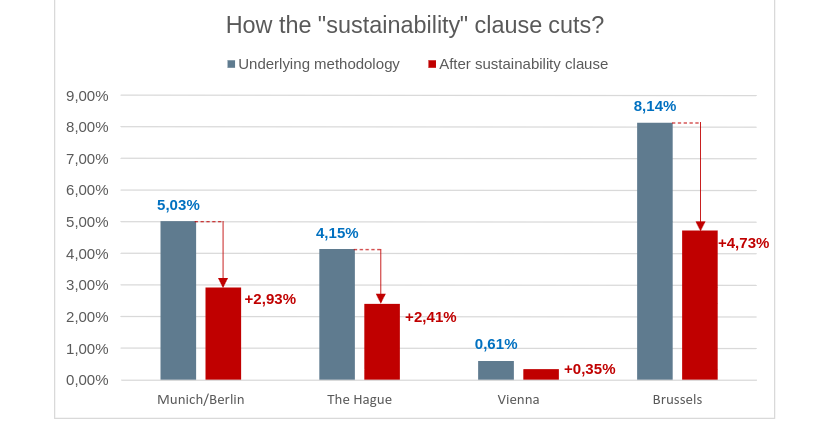EPO Salaries Reduced: EPO's “Sustainability” Clause "Cuts the Average Overall Adjustment for Staff by –41,8%."
THIS week we shall focus [1, 2] on the EPO. Almost 15 years ago the coup (French term) had begun with the Frenchman Benoît Battistelli, who in 2018 left in charge his longtime French friend António Campinos. They've both been culling the EPO, strip-mining and raiding what's left of it (and especially its past reputation) for some quick cash. Unlike their friend and political ally Michel Barnier, they seem to face no consequences for anything they do, however controversial if not seriously illegal. Aside from European software patents - i.e. patents which are both illegal and undesirable - the EPO grants loads of patents (probably hundreds of thousands so far) that no patent-centric courts would honour except fake ones (and yes, they've worked hard to ensure fake courts exist too).
What does this all mean for staff? More money? Will they share the crime's loot? Nope. The examiners in particular are just being used by the oligarchs' enablers, i.e. people like Battistelli and Campinos, two highly corrupt officials who basically bought their position/role (bribery). This isn't Moscow we're talking about, albeit sometimes it seems apparent that the political systems work similarly. Officials in Brussels have become a participating component in it, so Brussels lacks an incentive to actually tackle the corruption (i.e. to hold itself accountable). Kluwer Patent Blog is still run by the likes of Brian Cordery (Bristows), so they cannot stop promoting the fake 'courts', as does IP Kat (also Bristows-inflicted, it never stopped).
The Central Staff Committee (CSC) still has the guts to talk about EPO affairs, unlike the blogs above (they're basically compromised and increasingly part of the problem because they're controlled by "the industry", i.e. patent maximalists and litigation profiteers, not scholars).
This is what the CSC said a week ago about cuts to salaries (as costs grow rapidly across Europe):
Zentraler Personalausschuss
Central Staff Committee
Le Comité Central du PersonnelMunich, 02.12.2024
sc24067cpSalary adjustment for 2024 as of 1 January 2025
A “sustainability” cutBack in 2019, Mr Campinos mandated Oliver Wyman and Mercer to perform a Financial Study which wrongly predicted deflation and long-term global recession. The bundle of financial measures voted in 2020 to cover the alleged financial gap comprised the revision of the salary adjustment procedure with the introduction of the “sustainability” clause capping the overall growth in salary mass at Eurozone inflation + 0,2%. Despite a unanimous opinion of the Appeals Committee considering the “sustainability” clause to be flawed, Mr Campinos persists in applying it. For 2024, the clause dramatically cuts the average overall adjustment for staff by –41,8%1.
Costs of living and parallelism with salaries of civil servants…
Historically, the EPO salary adjustment procedure stems from the one used in the Coordinated Organisations (COO) and is based on two principles:First, the costs of living updates are made by starting with national inflation (HICP) in Belgium to which are applied the power of purchase parities (PPPs) calculated by the International Service for Remuneration and Pensions (ISRP) for each place of employment. This ensures equality of purchasing power among sites.
Second, the parallelism with the evolution of salaries of civil servants in eight reference countries represented by a specific indicator calculated by deflating their salaries and reflecting the trend in real terms.
…abolished by the “sustainability clause”
Since the first mandate of Mr Campinos, the EPO is on a “sustainability” campaign to justify the deterioration of working conditions. Mr Campinos introduced in 2020 a “sustainability” clause capping the overall growth in salary mass at Eurozone inflation (at 2,5% on 1 July 2024) + 0,2%. This year, the clause cuts the salary adjustments as follows:______
1 CA/85/24, par. 19: "The percentage difference between the weighted average salary adjustment of +4,6% and the cap of +2,7%, is approximately 41,8%. This means that a reduction of 41,8% must be applied to the adjustment of each salary scale calculated using the underlying methodology"
The overall adjustment for staff is cut by –41,8%. This situation is unique among International Organisations. After 5 years of introduction of the “sustainability” clause at the EPO, none of them considers this clause as an example to follow and to be included in their own salary adjustment procedure.
On the breach of the principle of equal treatment
Colleagues in the same salary group and step are entitled to equal pay, regardless of where they are employed. What is meant by equal pay is expressed by the coefficients of purchasing power parity (PPPs) listed in CA/85/24, Table 6 calculated and recommended by ISRP and are to be followed according to Article 64(6) ServRegs. The basic salary of a colleague in JG 6 at the end of their career amounts to the value according to grade 9, step 5 (G9-5) in the salary table for the respective place of employment. The G9-5 salary in Austria according to Table 4 amounts to EUR 9.124,73. The equal pay in the Netherlands is to be derived according to the PPPs in Table 6, which are 1,0448 for (AT) and 1,1044 (NL). It follows that the G9-5 salary in the Netherlands should amount to EUR 9.124,73 / 1,0448 * 1,1044 ≈ EUR 9.777,12. However, the amount listed for the G9-5 salary in the Netherlands according to Table 2 is EUR 9.508,45. This is EUR 171,74 less than the due amount according to equal pay. This significant discrepancy is not caused by rounding errors, but it is a severe breach of the principle of equal treatment.On the breach of the parallelism with salaries of civil servants
Since 2021, the specific indicator had an index value below 100 (for 2021: 99,1 for 2022: 96,1 for 2023: 98,3) reflecting that during these years, on average, the reference countries did not increase the salaries of their civil servants to the levels of inflation observed.However, for 2024, the specific indicator is 102.6 showing that the respective governments opted for a catch-up. The main driver is the very positive net salary evolution for civil servants in Germany (+5.3% in March 2024), the Netherlands (+8.5% in July 20242) and United Kingdom. However, the EPO “sustainability” clause capping the overall growth of salary mass at Eurozone inflation + 0,2% abolishes the positive effect of the indicator and the parallelism is not followed.
On the redistribution “pool”
The Advisory Group of Remuneration noted (CA/85/24, par. 50) that the percentage of the calculated salary adjustment for each EPO host country not used to adjust the salary scales is to be carried forward to a redistribution pool. The precise percentages cannot be found in the documents submit- ted to staff and the Council. The administration persistently refused to communicate them in the statutory meetings and only provided them from the tip of the lips at the end of the consultation in the GCC meeting of 19 November 2024. They are as follows:The administration was reluctant to explain how the percentages would be used for future adjustments or for the payment of a lump-sum at the end of application of the present salary adjustment procedure.
____
2 https://nltimes.nl/2024/03/30/salary-increase-85-percent-plus-50-euros-per-month-civil-servants
Conclusion
On 7 June 2024, the Appeals Committee delivered a unanimous opinion considering that the “sustainability” clause violated the principle of purchasing power parity. In the Communiqués of 13 June 2024 and 29 October 2024, Mr Campinos asserted his decision not to follow the recommendation and to continue to apply the “sustainability” clause for future adjustments. As a result, the “sustainability” clause is applied for the year 2024 and has a detrimental impact on staff.However, the Communiqué of 26 November 2024 on the results of the salary adjustment 2024 attempts to hide this fact by omitting to present relevant information for staff: the calculation of the salary adjustments before application of the “sustainability” clause, the percentages which are cut and put in the redistribution of the pool, as well as the massive savings made by the Office on liabilities. Our requests for more detailed information were not satisfied.
EPO staff works well for the organisation and deserve proper salary adjustments. They also deserve respect of our internal justice system and transparency.
With these sorts of "salary adjustments" (de facto reductions), how is the EPO expecting to attract the talented scientists or poach them from academia? The way things are going, the EPO has no actual plan to have suitably qualified new examiners, only obedient drones who grant many invalid patents, some of which might be judged - at some point in the future - by invalid (unconstitutional) kangaroo courts.
The EPO is nowadays an existential threat to the EU. █



